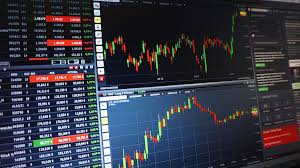What Is High-Frequency Trading (HFT)?
High-frequency trading (HFT) is a specialized form of trading that uses advanced computer programs to process a massive number of transactions in mere fractions of a second. This trading strategy relies on complex algorithms to analyze multiple markets and execute orders at lightning speed based on real-time market data.
In the world of HFT, speed is a crucial factor. Traders who can execute orders the fastest generally have a competitive edge over those with slower execution times. High-frequency trading is often associated with extremely high turnover rates and a large number of orders relative to actual trades.
Key Takeaways
- High-frequency trading is a form of algorithmic trading that executes a large number of orders in seconds.
- It helps enhance market liquidity and reduces bid-ask spreads.
- Critics argue that it gives large firms an unfair advantage over smaller traders.
- The liquidity provided by HFT is often short-lived, making it difficult for regular traders to capitalize on it.
Understanding High-Frequency Trading (HFT)
High-frequency trading is a subset of algorithmic trading that allows traders to make rapid decisions based on real-time data. This method enables traders to conduct a large number of trades in a very short period while monitoring market fluctuations and taking advantage of small price differences between markets, known as arbitrage opportunities.
Some key features of HFT include:
- Ultra-fast trading speeds
- Execution of a large number of transactions
- Short-term investment focus
Due to its complexity, HFT is primarily used by major financial institutions, banks, and hedge funds rather than individual retail investors.
HFT gained prominence when stock exchanges began offering incentives to companies that contributed liquidity to the market. For instance, the New York Stock Exchange (NYSE) introduced a group of liquidity providers called Supplemental Liquidity Providers (SLPs) to increase competition and liquidity. This initiative was launched after the 2008 financial crisis when liquidity became a major concern for investors.
The NYSE incentivized companies by offering rebates and fees for providing liquidity. Given the enormous number of trades conducted daily, HFT firms generate significant profits.
Some of the most well-known HFT firms include:
- Tower Research Capital
- Citadel LLC
- Virtu Financial
Advantages and Disadvantages of High-Frequency Trading
Advantages
One of the biggest advantages of high-frequency trading is its speed and efficiency. Large financial institutions and banks can execute thousands of trades in mere seconds, making the process highly efficient.
HFT has significantly improved market liquidity and helped narrow bid-ask spreads, which benefits traders and investors. This was demonstrated when Canada imposed fees on HFT, leading to a measurable increase in bid-ask spreads. Studies found that overall bid-ask spreads in the market widened by 13%, while spreads for retail traders grew by 9%.
Disadvantages
Despite its benefits, HFT has faced considerable criticism. One of the main concerns is that it has replaced traditional broker-dealers, relying solely on mathematical models and algorithms rather than human decision-making.
Since transactions happen in milliseconds, sudden and drastic market movements can occur without any logical reason. A prime example of this occurred on May 6, 2010, when the Dow Jones Industrial Average (DJIA) experienced a dramatic 1,000-point drop within 20 minutes, erasing nearly 10% of its value before quickly rebounding. A government investigation later revealed that a massive sell order triggered this market crash.
Another major critique is that HFT benefits large financial firms at the expense of smaller traders. Additionally, the liquidity it provides is often temporary—appearing for a brief moment before disappearing, making it difficult for regular traders to leverage it effectively.
Pros and Cons of High-Frequency Trading
Pros:
- Allows execution of a high volume of transactions quickly
- Streamlines trading processes with automation
- Enhances market liquidity
- Helps reduce small bid-ask spreads
Cons:
- Replaces human decision-making with algorithms
- Can cause abrupt and significant market fluctuations
- Short-lived liquidity makes it difficult for traders to take advantage of opportunities
How Does High-Frequency Trading Work?
High-frequency trading is a fully automated trading method that leverages algorithms to detect trading opportunities in real-time.
These algorithms scan vast amounts of market data, identifying price discrepancies and executing trades accordingly.
HFT is mainly used by institutional investors, hedge funds, and banks rather than retail traders due to its complex nature and the need for advanced infrastructure.
While HFT contributes to market liquidity, it can also lead to sudden and drastic price movements. Additionally, the removal of human oversight raises concerns about unintended market disruptions.
Does High-Frequency Trading Exist in Cryptocurrency Markets?
Yes, high-frequency trading is actively used in cryptocurrency markets. Just like in traditional financial markets, algorithms analyze crypto trading data and execute a large number of transactions in a matter of seconds.
Due to the high volatility of cryptocurrencies, HFT strategies can capitalize on rapid price fluctuations.
How Fast Is High-Frequency Trading?
High-frequency trading is incredibly fast, with trades being executed in as little as 10 milliseconds or even less.
Some advanced trading systems process thousands of transactions in the blink of an eye, giving them a massive advantage in capturing small price discrepancies.
The Bottom Line
The rapid advancements in technology have revolutionized the financial industry, and high-frequency trading is a prime example of this transformation.
By leveraging computer algorithms, large financial firms can identify profitable trading opportunities and execute trades almost instantly.
While HFT has undoubtedly improved market efficiency and liquidity, it also comes with risks. Its reliance on automation can lead to unintended market crashes, as seen in 2010, when the Dow Jones suffered a dramatic intraday decline.
Moreover, critics argue that HFT primarily benefits large firms while leaving smaller traders at a disadvantage.
Overall, high-frequency trading plays a crucial role in modern financial markets, but it remains a subject of debate due to its advantages and potential risks.
Join Gen z and millennials TaskForce official 2025 WhatsApp Channel To Stay Updated On time the ongoing situation https://whatsapp.com/channel/0029VaWT5gSGufImU8R0DO30


